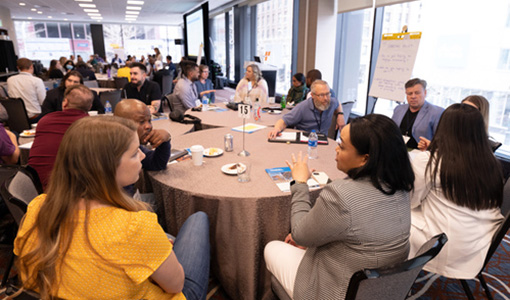Follow in the Footsteps of Communities Planning Solar Deployment That Works for Them
Apply to the Solar Community Assistance for Local Equity (Innovation at SCALE) Initiative To Receive Technical Assistance for Communities and Organizations Across the Country
When Boston Mayor Michelle Wu was looking for ways to make the city's goal for carbon neutrality by 2050 more equitable, city of Boston staff turned to the Solar Energy Innovation Network (SEIN), a program run by the National Renewable Energy Laboratory (NREL).
The program informed Boston leaders how to build from insights developed by a SEIN project team from Tampa Bay, Florida, and prompted NREL researchers and SEIN partner Converge Strategies to apply the Clear Sky Toolkit, available on the Tampa Bay website. The toolkit's capabilities and usage provided the city of Boston staff with potential sites for solar plus storage that met community needs and city goals.

Similarly, West Atlanta community leaders drew inspiration from SEIN project team Breaking Barriers to develop the first community-owned resilience hub in Atlanta, Georgia, which you can read about in a press release from Groundswell, one of the project partners. The Breaking Barriers project undertook work to enable innovative urban energy resilience hubs integrating microgrid technology, on-site solar generation, and battery energy storage. NREL researchers adapted insights from Breaking Barriers to create an energy resilience menu that could be adopted by other communities across the country.
These communities are using blueprints created through SEIN, which brings multistakeholder teams from across the United States together to collaborate and create innovative strategies for overcoming barriers to solar deployment. Recent SEIN teams have focused on equitable deployment of solar.
Creating Pathways for Equitable Solar Deployment
Equitable solar deployment is the intentional focus on historically underserved communities who have disproportionately fewer opportunities for or less access to solar technology to help ease energy burdens and ensure the benefits of clean energy are more equitably distributed.
To date, solar energy deployment has been skewed. Research published in Nature Sustainability found that Black- and Hispanic-majority census tracts have installed significantly less rooftop solar than other tracts, even when controlling for income differences.
During Round 3 of SEIN, underserved communities from many states across the country identified barriers to solar adoption and piloted solutions, including putting solar panels on Black, Indigenous, and people-of-color-led houses of worship and finding ways to make solar energy accessible to underserved small businesses.
Innovation at SCALE Program Assists Communities and Organizations Interested in Solar Energy
SEIN's companion initiative—Innovation at SCALE (Solar Community Assistance for Local Equity)—enables interested communities and organizations to take the findings from recent SEIN projects and adapt those solutions to their own needs.
With Innovation at SCALE, NREL and partner organizations are offering technical and analytical assistance to help communities and organizations overcome barriers to solar energy adoption and enable just and equitable solar deployment. Participants will engage with subject matter experts and SEIN project leaders to identify and implement the insights and lessons from those projects that are applicable to their needs.
Find a Topic Area That Is Relevant to Your Community or Organization
Over the years, SEIN project teams have explored solar through various cohorts within the program. These cohorts focused on innovating equitable access to solar, solar in rural areas, commercial-scale solar, and residential solar adoption.
Assistance through Innovation at SCALE focuses on specific topic areas that have been explored by previous SEIN project teams. An Innovation at SCALE participant may benefit by drawing from multiple topic areas, depending on their community's unique circumstances.
These topics for assistance are not mutually exclusive:
- Financial Pathways to Solar Deployment
- Community Engagement and Outreach Strategies for Solar Deployment
- Solar for Small Businesses in Underserved Communities
- Disaster Resilience Through Solar+Storage.
Prospective Innovation at SCALE participants should review the topics detailed on the SEIN Innovation at SCALE webpage to find which ones align with their communities' goals and barriers related to solar adoption.
How To Apply to the Innovation at SCALE Program
Innovation at SCALE is open to all U.S.-based stakeholders, including but not limited to community-based organizations, local government entities, regulatory authorities, and electric utilities. Individual organizations or teams of stakeholders are eligible for support.
Requests for assistance through SEIN Innovation at SCALE are currently open, and assistance is provided at no cost to requesters. The number of assistance opportunities is limited, so potential Innovation at SCALE participants are encouraged to submit requests as soon as possible.
Apply by June 28, 2024, to be scheduled for an intake meeting July 10–24, 2024, and receive technical and facilitation assistance in the August–October time frame.
To apply, complete a request form available on the SEIN Innovation at SCALE webpage.

